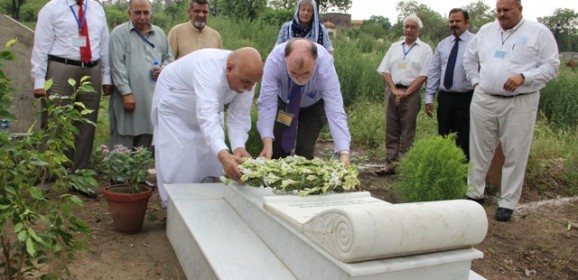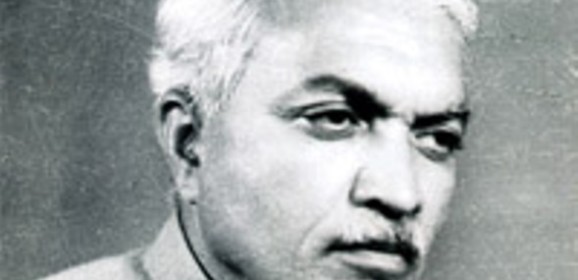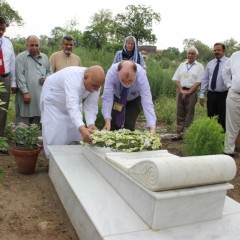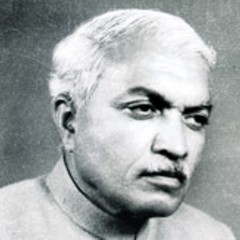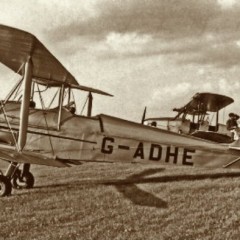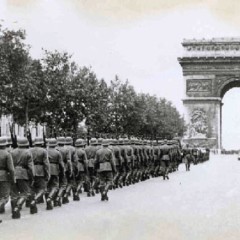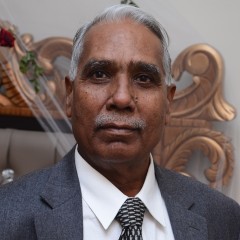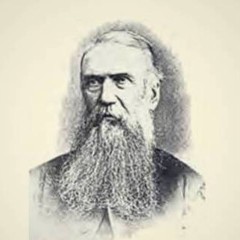Wreath Laying Ceremony at Dr Charles Forman’s Grave
On Friday 8 August 2014, the Rector Forman Christian College Dr James A Tebbe and Formanite Mr Akhtar Hafeez Randhawa laid a wreath at the grave of Dr Charles W Forman in the Christian Cemetery near Taxali Gate. The brief ceremony, organized by the Advancement Office, was one of the many events F C College has held to mark this anniversary. Mrs Beth Tebbe, wife of the Rector, also laid a wreath at the grave of Mrs Margaret Forman, wife of the Dr Forman. Senior alumni, faculty and staff of FCC were present at the occasion. FCC Chaplain Rev Babar Rana said a prayer of thanksgiving for the life and service of Dr Forman....
The Making of a Revolutionary: Durga Das Khanna
For Durga Das Khanna, former Chairman, Punjab Legislative Council, the urge for freedom was sufficiently strong to take him quite close to the gallows. In 1931, he was sentenced to death by the Lahore Sessions Judge for his part in the conspiracy to assassinate the Governor of Punjab. He was acquitted later by the High Court. Scion of an orthodox family, Khanna became very close to Bhagat Singh and Sukhdev. In an interview recorded by the Nehru Memorial Library, eight years before his death in 1984, he describes how he was induced to give up his conservative moorings and drawn into the revolutionary band that sought to end the British rule in India by use of force: I belong to a family which had no political background. It was an orthodox Hindu family. I was born in 1908. My father and grandfather were doing money-lending business. One of my uncles was a senior advocate of the Lahore High Court. My reaction to the profession my father and grandfather were engaged in was rather adverse right from childhood. I remember people coming and being advanced all kinds of amounts and paying high rates of interest and I always used to wonder if my family was not living on the wants and miseries of others. This created almost a revolution in my mind, but I thought it wiser to keep my counsel to myself, though once or twice I did argue with my grandfather why he could not give up the profession. He said that this was something done not only by him, but by so many others and that it was a traditional way of helping people to carry out their needs. I had a religious bent of mind from the very beginning. My one attraction was the Guru Granth Sahib, which my father used to read daily. I began to visit the gurdwara, opposite Lahore Fort, which had been established in the memory of Guru Arjan Dev. Somehow of all the 10 gurus of the Sikhs, Guru Arjan Dev impressed me the most and I would go there every Sunday and listen to the bani [Sikh holy texts]. When I passed my matriculation in 1924 I applied to two colleges — Government College, Lahore, and Forman Christian College. I was not admitted in Government College and I am glad I was not. In FC College I found a very free atmosphere. The Principal, Dr E D Lucas, was a wonderful man and if I can think of the first influence on my mind about the national movement, it was from him. This, of course, does not take into account...
Message from Alumnus Flying Officer Turab Ali Khan Agha
December 1941 I am herewith sending you a few notes on my Civil Aviation career since leaving the College. I do hope you will forgive me for not including my flying duties with R.A.F. in which case I have to take special permit from A.H.Q. and I am afraid to do that; one has to apply at least a fortnight earlier. 1933 joined Europe’s famous Air Service Training School at Hamble, England. 1934 took part in the Isle of Wight Air Race and was placed third. 1934 was the first Indian to fly aircraft in the King’s Cup Air Race*. 1935 received Air Ministry’s Commercial ‘B’ Pilot’s licence. 1935-36 flew extensively all over European continent, North Africa, Middle East and Anatolia. 1937 joined Tata Air Line as pilot on regular routes in India and Ceylon. 1939 when war broke out was the first Indian ever to receive commission in the R.A.F.V.R.** as pilot. Have flown 30 different types of single and multi-engine aircraft which include high power service types. Approximately flown about 1,500 hours, covering 200,000 miles. Notes: * The King’s Cup Race was an annual British handicapped cross-country air race, run by the Royal Aero Club Records Racing and Rally Association and first contested in 1922. The event was open to British pilots only, but that did include members of the Commonwealth. The event was established by King George V as an incentive to the development of light aircraft and engine design. The first race was an 810-mile contest from Croydon Aerodrome, south of London, to Glasgow, Scotland and back again after an overnight stop. There were no races during World War II, and the contest did not resume until 1949. The race was abandoned in 1951, due to bad weather. [Edited from en.wikipedia.org] Records show that “T.A.K. Aga” flew a D.H.60G III Moth Major in the 1934 King’s Cup Race and was forced to land in Reading due to a fuel problem. [http://afleetingpeace.org/afp/the-kings-cup/about/64] ** Royal Air Force Volunteer Reserve Text and Photo: The Folio: FCC Magazine, Vol. XXXIII, No. 1 October-November 1941 Map: http://afleetingpeace.org/afp/the-kings-cup/about/64 Photo of aircraft: http://cdn-www.airliners.net/aviation-photos/photos/2/8/2/1645282.jpg...
FCC Alumna loses life in WWII
Miss Sarasvati Kitchlu whose collegiate career was wholly with us from Intermediate to the M.Sc. and who for a short time filled the post of Demonstrator in Physics on our Staff, went abroad three years ago to the Madame Curie Institute in Paris. She worked at the Institute until the fall of France, when she was arrested and taken to a concentration camp. She, however, was released and found her way to Lisbon. During her passage from Lisbon to England her boat was torpedoed and she lost her life. Source: The Forman Alumnus: News Bulletin and Magazine of the Forman Christian College Alumni Association, Vol II, No 1, December 1941. Image: http://simple-living-in-suffolk.co.uk/wp-content/uploads/2011/11/111111arc1940.jpg...
Remembering Prof Jawaid Austin: A Red Box
by Amoon Austin I cleaned out my dad’s room after his departure from this world on 28 September 2013. I thought I knew him pretty well but this activity helped me discover new things about him. It was almost like his office could talk to me and tell me about the person that I knew very little about. He had a stack of very interesting journals, religious books, mathematics books, novels and very fine poetry collection all of which depicted those traits of his personality that I was well aware of. Some of the traits included how well organized he was, his love for literature (though he was a mathematics professor), his spirituality and cleanliness. In addition to the various things I found in his office, he also had a collection of his children’s achievements with little notes of appreciation written on them by him. I knew he loved me, but this particular discovery hit me hard, as the intensity of his love for his children sent a chill down my spine. Everything reminded me of various moments I spent with my father over the past 27 years. Writings, photos, objects and his books transported me back in time. While going through his possessions in his room at home, which had so much to tell, I opened his closet to give away his clothes to the poor. I looked at his suits and shoes, then shifted my attention to his dressing table where he kept his watch, ring and other items. I came across a bright red box – my first impression was that it would have some gold item in it. Within a few seconds I had made a long list of assumptions of what the box contained: gold ring, bracelet, chain, or maybe bangles for my mother. Breaking the long depressing silence my mom and I were working in, I told her that maybe it contained something for her as dad was so fond of surprising her all the time. A whirlpool of feelings washed over her, evident from her expression, as I handed her the box to open. To our surprise it was a coat pin, a souvenir from the 100-year celebration of Forman Christian College. At once she recalled her conversation with my father about the souvenir. She told me how excited my father was and really looking forward to FCC’s 150th anniversary in 2014. He was happy for two reasons: first, it was his 50 years batch celebration; and second, it was the college’s 150 years celebration. Then she got up, sifted through some more things that belonged to my father and emerged with...
Urdu Works of Dr Charles W Forman
By Prof Tahir Masood Forman Christian College, now a chartered university, is celebrating the 150th year of its establishment. At a time when the institution is gathering its best alumni and remembering yesteryears, it would be unfair to forget the work done by Dr Charles W Forman (1821-1894), the founder of Rang Mahal Mission School and The Mission College later named Forman Christian College, Lahore. The college was named after Dr Forman, who was a great educationist and linguist. Since 1849, when the British annexed Punjab, he spent a large part of his time in educational work. He was associated with the work of the Education Department from the time of its formation in 1856 and served on many educational committees, besides being a member of the Senate of the Punjab University College (1870) and Punjab University (1882) until his death in 1894. He was greatly distinguished as the “Most Experienced Teacher in Punjab”. In the beginning of January 1848, Dr Forman arrived in Calcutta. After a stay of a few months there and he went to Agra, where he developed an interest in native languages. His next destination was the newly-annexed territory of Punjab. He reached Lahore on 21 November 1849 accompanied by Rev John Newton (who afterwards became his father-in-law). They established a small Mission School on 19 December 1849, which was located outside Bhatti Gate, Lahore. Although it was an English-medium school, yet Dr Forman did not ignore the importance of Eastern languages and learning. He learnt numerous languages like Arabic, Sanskrit, Persian, Hindi, Punjabi and Urdu and was a great admirer of Urdu language and literature. Maulvi Noor Ahmad Chishti, an eminent historian, was known as an expert in the teaching of Persian, Punjabi and Urdu languages to civil and military officers and the ruling elite who came to India in those days. He charged Rs 20 per month as tuition fee and devoted one hour daily to each student. About 2,000 foreigners learnt different native languages from him until his death in 1867. Dr Forman was also a student of Maulvi Noor Ahmad Chishti. Given his command and experience of Urdu, the Punjab Government appointed Dr Forman a senior member of the Textbook Committee on Urdu Books in 1873. Dr Forman wrote a large number of books in Urdu, a clear proof of his love for and devotion to the Urdu language. During my MPhil research in various libraries and archives, I came across a large number of published writings of Dr Forman, written during his 45-year stay in Punjab. Most of his published Urdu writings are on social and religious subjects. His writings...

